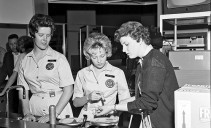Are You Workforce Ready?
While the majority of college students feel prepared to move from high school to higher education, they are often less confident about making the next big transition, from college to the workplace. In separate 2015 studies from McGraw Hill Education, Gallup-Purdue and the National Association of Colleges and Employers (NACE) current students and alumni provide their perspectives on topics related to career development. What are their recommendations? You can improve your readiness for employment, even before you graduate, by getting involved with the activities listed below.
Pursue an Internship
Sixty-seven percent of students responding to the McGraw Hill survey said they wanted more applied learning opportunities, such as internships. And 65% of students surveyed by NACE said that they had participated in an internship or co-op. According to the Gallup-Purdue report, students who completed internships or other experiences that link course topics with careers were more likely to agree that college was worth the costs. This is the kind of learning that not only builds job-related skills and realistic expectations about your field of interest, but also results in professional networking and potentially a job offer from the internship sponsor.
Do this: Contact your school’s student employment office, academic advisors, degree program faculty members and the career center to find out what is possible for students in your major. Placement assistance may be available with employers who are already partnering with your college.
Get to Know Your Instructors
Almost 80% of students surveyed by NACE relied on faculty members as a job search resource. We don’t usually think of instructors in this capacity, but they have a lot to offer in terms of general career information, networking introductions and mentoring. Many faculty members also work outside academia in positions relevant to the topics they teach. The Gallup-Purdue survey also links strong faculty-student relationships to positive alumni feedback about the value of a college education.
Do this: Take advantage of drop-in office hours and individual appointments to make meaningful connections with your instructors; ask them to share their work experiences, find out about ongoing projects and get advice for succeeding at your first job after graduation.
Make Career Connections in Your Courses
More than 60% of students in the McGraw Hill study wanted courses that were better designed around career preparation and job skills. Many schools are focused on creating a curriculum that assists students’ career development, but not every class will provide this kind of structure. You can help close the gap by finding ways to connect course assignments to your own career exploration.
Do this: Talk with instructors when you have a choice on project or paper topics, for example, to find out how you can focus on trends in your field of interest.
Meet with a Career Advisor
More than half of the students surveyed by McGraw Hill reported that they didn’t learn about resume writing, interviewing, or professional networking while they were in college. These are critical job search skills. Your school’s career center is ready and able to assist with all of these activities and more. It’s never too soon to start thinking about applying for jobs. Contact career counselors early in your academic program to get the process started.
Do this: Make an appointment with your career center, in person, online, via phone or Web conferencing system. From one-on-one and group counseling to workshops and job fairs, you’ll career center staff and resources are ready to help you matching your interests and practical experiences with employer needs and expectations.
Seek Out Work-Based Learning Opportunities
William Symonds, Director of Arizona State University’s Global Pathways Institute has issued a call to action: “Make career guidance a central focus of our education system.” This call encourages teachers and administrators at all levels (i.e., K12, community college, technical programs, universities) to incorporate work-based learning initiatives that prepare students for successful employment. Students can act on these suggestions as well, and participate in formal and informal career preparation activities beyond the classroom.
Do this:
- Set up an informational interview with someone working in your field and in your local area. Ask about workplace tours and job shadowing opportunities.
- Contact your school’s alumni organization to see if work-related mentoring programs are available for current students.
- Contact business groups, such as the Chamber of Commerce, in your town to find out more about professional networking events and student-centered initiatives.
Career development is an ongoing process that continues throughout your working life. Learning and skill development are always taking place. Workplace readiness means not only conducting a successful job search, but also understanding what to expect and having the skills to complete assigned tasks once you are hired. Readiness takes time, so take advantage of the resources you can access as a college student and prepare for the future now.
Image credit: NEC Corporation, Flickr, CC:BY



